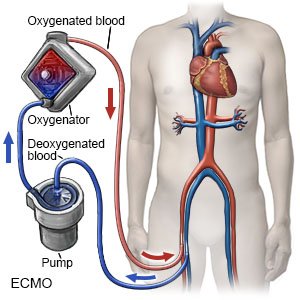Ecmo (Extracorporeal Membrane Oxygenation)
Medically reviewed by Drugs.com. Last updated on May 6, 2024.
What do I need to know about ECMO?
ECMO is a type of temporary life support. ECMO is used in critical care situations when someone has a life-threatening illness or injury. ECMO works as a temporary heart and lungs when one or both of those organs are not working correctly. ECMO is usually used along with a ventilator.
How does ECMO work?
The person will usually be given sedation to keep them calm and comfortable during ECMO. The surgeon will place one large IV catheter to draw the blood out. A second IV catheter may also be inserted to return the blood to the body. These catheters are usually placed in the groin, chest, or neck. Blood is pumped out of the body and filtered through a machine. The machine adds oxygen and removes carbon dioxide. Then, the blood is pumped back into the body.
 |
How long can ECMO be used?
ECMO is usually used for a few days. In some cases, ECMO might continue for a week or more.
What should I expect after ECMO?
The person is slowly weaned off the ECMO machine as their condition improves. Healthcare providers monitor the person closely as their heart and lungs start to work again. This can take several days. When ECMO is no longer needed, the IV catheters are removed. The insertion sites may be closed with stitches or covered with a bandage.
What are the risks of ECMO?
The person may bleed more than expected or develop an infection. The blood oxygen level may not stay at an expected level. A lack of blood flow to the limbs may cause tissue damage. The ECMO machine may stop working. The person may have a seizure or a stroke or develop a blood clot. Any of these can be life-threatening.
Care Agreement
You have the right to help plan your care. Learn about your health condition and how it may be treated. Discuss treatment options with your healthcare providers to decide what care you want to receive. You always have the right to refuse treatment. The above information is an educational aid only. It is not intended as medical advice for individual conditions or treatments. Talk to your doctor, nurse or pharmacist before following any medical regimen to see if it is safe and effective for you.© Copyright Merative 2024 Information is for End User's use only and may not be sold, redistributed or otherwise used for commercial purposes.
Further information
Always consult your healthcare provider to ensure the information displayed on this page applies to your personal circumstances.
